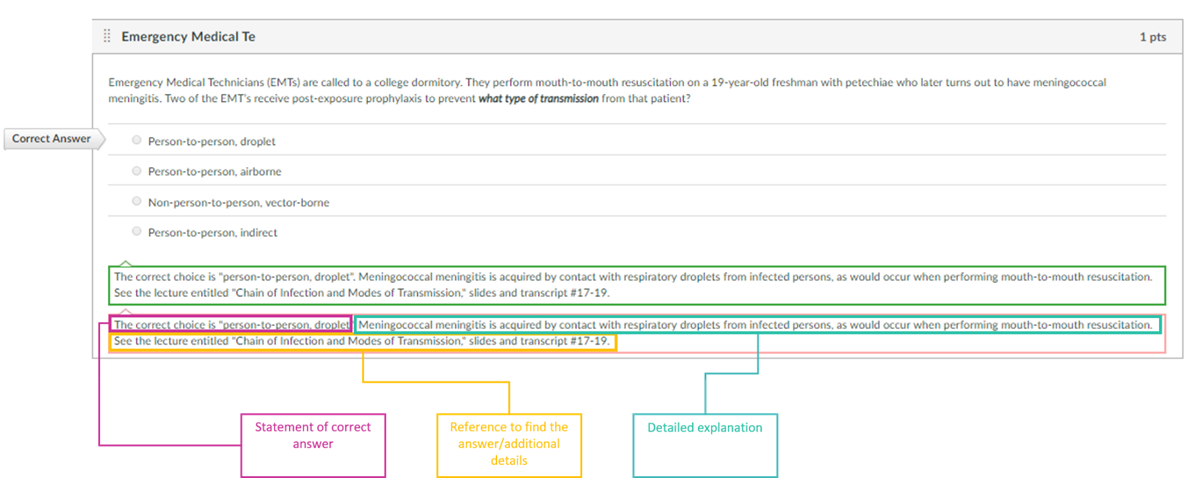Tags: Assessment, Evaluation, Mastery, Quizzes
Description
Information retention and transfer can be enhanced when a learner is given multiple opportunities to recall new information. In an online course, this can be done by integrating low-stakes quizzes that allow multiple attempts and providing meaningful feedback on students’ performance. Offering a low incentive and multiple attempts will help to remove the pressure often associated with high-stakes quizzes/exams and encourage the learner to focus on the material as opposed to a grade, while meaningful feedback zeros in on areas of improvement and provides resources for correction. Note that the level of mastery can be subjective and thus can be predetermined by the instructor (e.g., learners must score an 80% to be considered as passing) (Gillard-Cook & West, 2006).
Benefits of low-stakes quizzes with integrated feedback
- Encourages learners to achieve mastery
- Allows learners to identify and self-remedy potential learning gaps
- Allows for instructors to direct learners to the proper resources to fill potential learning gaps
- Encourages interaction with the learning content
- Encourages learners to take ownership of their learning
- Reduces learner anxiety often associated with online quizzes and exams
- Provides learners with multiple opportunities to demonstrate understanding
Meaningful Feedback
Providing meaningful feedback on assignments is a useful strategy that can further enhance and promote mastery when coupled with low-stakes quizzing/exams. It “enhances critical thinking, reflective practice, and develops instructor-student relationships which is important in an online environment” (Rottman & Rabidoux, 2017). It is recommended that meaningful feedback be comprised of the following elements:
- Statement of the correct answer
- Detailed explanation of the answer
- Reference to find the answer and/or additional resources on the topic
Inclusion of these elements encourages the learner to not only garner an explanation of the correct answer, but to also interact with the content filling any learning gaps that may exist on their own. Additionally, since multiple attempts have been allowed, the learner may return to the assessment, further encouraging mastery.
Low-stakes testing with meaningful feedback does not penalize learners for making mistakes, but instead, shifts the focus to mastery. It encourages the learner to make an attempt, and if a mistake is made, be provided with meaningful guidance on how to correct the mistake on their own.
Link to example artifact(s)
In the example below from a quiz, the instructor provides detailed feedback to the student whether they get the answer correct or incorrect.
Instructor(s): Donna Haiduven, PhD, RN, CIC, CPH
Course Title: PHC 6517 Infectious Diseases Prevention
Link to scholarly reference(s)
Davis, K. A. (2013) Using low- and no-stakes quizzing for student self-evaluation of readiness for exams, International Journal of Construction Education and Research, 9:4, 256-271. https://doi.org/10.1080/15578771.2013.809036
Gillard-Cook, T., & West, B. (2006). Authentic learning: Rethinking quizzes and exams for greater impact. Retrieved from https://evolllution.com/opinions/authentic-learning-rethinking-quizzes-exams-greater-impact/
Kuh, G. D., Kinzie, J., Schuh, J. S., & Whitt, E. J. (2010). Student success in college: Creating conditions that matter. San Francisco, CA: Jossey-Bass.
Low-stakes testing. (n.d.). Retrieved from https://www.oswego.edu/celt/low-stakes-testing
Rottman, A., & Rabidoux, S. (2017). How to provide meaningful feedback online. Retrieved from https://www.insidehighered.com/digital-learning/views/2017/09/06/how-provide-meaningful-feedback-online-course
Warnock, S. (2013). Frequent, low-stakes grading: Assessment for communication, confidence. Faculty Focus. Madison, WI: Magna Publications.
Yuretich, R. F. (2004). Encouraging critical thinking. Journal of College Science Teaching, 33(3), 40-45. Retrieved from https://search.proquest.com/docview/200358716?accountid=10003
Citation
Trail-Constant, T. (2018). Using low-stakes quizzes to encourage mastery. In B. Chen, A. deNoyelles, & A. Albrecht (Eds.), Teaching Online Pedagogical Repository. Orlando, FL: University of Central Florida Center for Distributed Learning. https://topr.online.ucf.edu/r_1bqm5vidardcec6/.Post Revisions:
- August 6, 2020 @ 13:15:05 [Current Revision]
- August 6, 2020 @ 13:15:05
- December 10, 2018 @ 18:17:37
- December 4, 2018 @ 02:38:19


